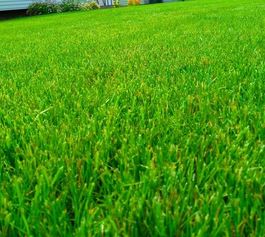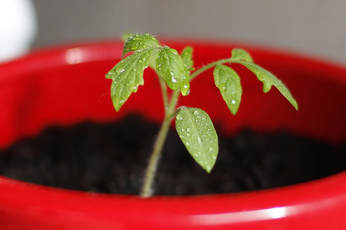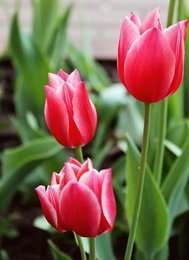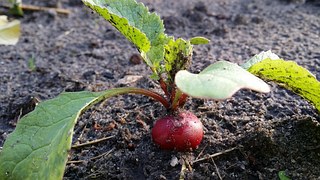 Since autumn is just around the corner, that means your lawn’s growing season is just around the corner as well. You may have noticed your grass slows down during the summer months—it doesn’t grow as fast, which means less mowing, and it often takes on a brownish hue, some might even call it “crispy.” This, of course, is completely normal for Michigan lawns. The hot summer months are the dormant period for cool-weather grasses. But as the daytime temps dip into the 70s more regularly, and precipitation picks up, you can expect your lawn to start “growing and greening” again. With that, there are some things you can do to make your lawn healthier and thicker. 1. Fall is a great time to fertilize. Good Sweet Earth applies organic fertilizer (an alfalfa blend fertilizer) twice a year: in spring and fall. If you were going to only apply fertilizer one time a year, I recommend fall over spring. Why? A few reasons: First, fall fertilization gives your lawn some nutrients before the long, harsh winter. This will make it less distressed when spring rolls around. It also adds organic matter to your soil to help insulate the roots a bit. Second, if you’re applying slow-release organic fertilizer, it won’t break down entirely before winter sets in, which means there will likely be some semi-composted product still on your lawn in the spring; it’s sort of an early spring meal for your lawn which will help green it up early and get it growing strong. Finally, there are less weeds germinating in the fall, which means the nutrients you put in your soil will be more available for your grass, instead of those nasty invasive plants you’d rather not be fertilizing. If you're interested in having us apply some alfalfa blend fertilizer to your lawn, get in touch. 2. Fall is the ideal time to overseed. Like fertilizing, you can overseed in either spring or fall. I prefer late summer/early fall because your grass seeds won’t be competing for space with weed seeds as much. Those gaps in your lawn where grass isn’t growing are prime real estate for weeds. But as your soil gets healthier from organic lawn treatments, those gaps will fill in with grass—unless weeds get there first! In the fall, there are less weed seeds looking for a home, so putting grass seed down in late-August or earl-September (you could do it as late as the first part of October, especially if we have a warm fall) will ensure the grass has a head start over the weeds come spring. To overseed, first, mow your grass lower than you normally would; if the clippings are especially long or clumpy, rake them up so the seed can fall easily to the soil below. Second, buy a sun/shade mix and apply it with a spreader or scatter it evenly by hand. The rate you should be applying is typically 4-6 pounds per 1000 square feet (a 10,000 square foot turf space should be overseeded with about 50 pounds). For bare spots in your lawn: Mix the seed with a little potting soil (soil + compost) and apply it directly as a patch. If rain’s not in the forecast, water it regularly. Every year you do this will mean thicker and less weedy turf. 3. If you’re going to aerate your lawn, do it in fall. Summer is a bad time for aeration simply because you don’t want to distress your lawn any more than you have to during its dormancy. In fall, the grass is growing strong and can recover better from the aeration process. If you’re going to aerate, either hire a company to do core aeration (pulling plugs of soil out of the ground), or rent a core aeration machine and do it yourself. Do NOT succumb to the idea of putting spikes on your shoes and walking around your yard. That simply compacts the soil further. To properly aerate, you need to pull plugs out of the ground so that water and air can get in. Poking holes with spikes won’t do that. That being said, aeration is typically only necessary once every few years, and usually only with over-chemicaled yards. When soil is healthy, full of microbes, worms, bugs and organic matter, it doesn’t need core aeration—the worms and bugs and microbes aerate it for you.
0 Comments
 Michigan gives us a glorious six months to garden. Unfortunately, that simply is not enough time for some of our favorite vegetables to be direct sown into the garden. This gives you two options: either start your own or purchase starts from a farm or nursery. If you have a few seasons under your belt and feel confident starting your own here are a few tips and tricks to get you started. First, start off with a quality seed starting mix. Potting soil, topsoil, or soil out of your garden bed simply will not do for starting seeds. You can purchase premixed organic seed starting mix or you can mix your own. We mix equal parts coconut coir, sand, and vermicompost for successful plant starts. Next you want to ensure you have fresh seeds from a reputable source. The older your seeds, the less likely they will germinate. To test the viability of your seeds place 10 seeds evenly spaced between two wet paper towels, roll up the paper towels and seal in a plastic bag. Check seeds in two days to two weeks depending on the seed variety. Finally, timing is everything when it comes to starting seeds. If you start too early your plants can become root bound. On the other hand if you start too late, your seeds will not have the head start they need to reach their full potential. Remember, some vegetables and flowers are best grown by direct sowing including cucumbers, peas, green beans, zucchini, sunflowers and lettuce. Our cool weather crops will go in the ground mid-April depending on the weather. The remaining plants will go in the ground after the last frost on May 16. Happy gardening!  Photo courtesy Grand Rapids Public Museum Photo courtesy Grand Rapids Public Museum The primary reason we got into the organic lawn and garden business was to make a difference. Taking care of our planet is important to us. That means we want to make soil healthier, water cleaner, loved ones less-exposed to carcinogens, pets safer, farms more sustainable, air less-polluted and plants less-reliant upon chemicals from a laboratory. Our company's motto is “Healing the planet, one yard at a time.” We know that fixing the planet is a lot bigger job than we can handle with our soil amendments, fertilizers and lawn & garden services, which is why we make it a point to give back to organizations that believe in the same things we believe in: growing community gardens, promoting sustainable family farming, cleaning up our waterways, reducing waste and combating climate change. In 2017, we did this in three ways: First, we donated a portion of our profits to organizations that support sustainable agriculture and a cleaner environment. Last year, those organizations were Farm Aid and the West Michigan Environmental Action Council. Second, we partnered with West Michigan non-profits that have started community gardens, through our Give-a-Bucket program. In 2017, the two organizations that we worked with were Benjamin’s Hope in Holland and SECOM Resource Center in Grand Rapids. Individuals were able to donate Living Worm Compost at a reduced rate directly to those organizations’ gardens. Finally, we made several in-kind donations to groups like Camp Sunshine, the Grand Rapids Public Museum and Eighth Day Farm, to help support the work that they do. And so in 2017, because of Good Sweet Earth's amazing customers, we were able to give just over $850 in cash, compost and services to all of those great organizations listed above. In 2018, we’ll be doing it again, and we hope to double, or even triple, that amount. The more we bring in, the more we give away! So thank you, friends and family, for helping us in our mission to heal the planet, starting with your yard. Then from your yard, through donations, we’ve been able to reach even further across our planet, bringing about cleaner water and soil, a reduction in greenhouse gasses, and stronger family farms. In fact, every bag of compost or gallon of Worm Tea you buy helps heal the planet well beyond the edge of your yard!  In West Michigan this time of year, especially in the Holland area, it's hard to avoid the hype around the tulip-- and for good reason. These bulbous members of the lily family are an annual reminder that spring has sprung; they thrive in areas with dry summers and cold winters, so West Michigan is a great place to enjoy them. If you're interested in growing tulips, or even if you've had them in your yard for years, we've got some tips for getting the most from these beautiful perennials. For planting:
Tulips don't last long, but they are a welcome flash of color after a cold gray winter. Follow these tips and yours will be the envy of the neighborhood for years to come. Source: Farmer's Almanac. Read more on raising tulips here.  I often hear at Farmer’s Markets that people would love to garden, but spring got away from them and now it’s too late. What if I told you it’s not too late? This is the perfect time to dig out that grass and till your soil or if you prefer raised bed, like I do, let’s get building. Here on the Good Sweet Earth homestead we are always trying to take steps toward food self-sufficiency and this fall we plan on installing a few more raised beds too. Our raised beds will be earmarked for berries come spring, but this summer and fall we have a few ideas for some fast growing vegetables that we can still plant and harvest this year. August is the perfect time to plant radishes, arugula, baby spinach, lettuce, and snap peas. Radishes take a mere 22 days to harvest and can be grown until the first frost. Snap Peas depending on variety take about 60 days to harvest. If you are feeling adventurous you could even plant some beets, broccoli, kale or swiss chard since all these vegetables take about 60 days to harvest too. Remember the days to harvest is not counted from the day you put the seed in the ground until you harvest but rather once the seed is germinated and growing to harvest. Check your first frost date. Here in Zeeland, Michigan, our first frost date is October 10 which means we have a 50 percent chance of frost. Our short growing season 156 days will come to an end before we know it so let’s make the most of it! Happy (August) gardening! |
